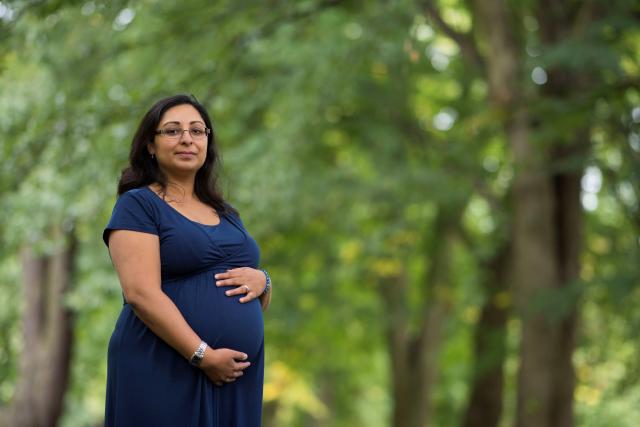
Welsh researchers giving new hope to expectant mothers living with Cystic Fibrosis
30 July
Welsh researchers, funded by Health and Care Research Wales, are giving expectant mothers living with Cystic Fibrosis (CF) new hope for managing cystic fibrosis through pregnancy and beyond.
Dr Jamie Duckers, Research Lead for the All Wales Adult Cystic Fibrosis Service, and Health and Care Research Wales Respiratory Specialty Lead, has lifted the lid on the findings of a study, CF-PROSPER, which was aimed at collating data on pregnant women living with Cystic Fibrosis to track their outcomes and understand how they and their children were affected.
The study, which was initially funded through a Research for Patient and Public Benefit Wales (RfPPB) grant, involved researchers from Cardiff and Vale University Health Board, Cardiff Metropolitan University, Cardiff University and the University of Liverpool.
Jamie said the study originated due to the changing landscape of Cystic Fibrosis, with improved life expectancy and new medicines many people with CF were now thinking of starting a family. However, some guidelines and advice given by healthcare professionals were outdated.
He said: “As healthcare professionals it was difficult to answer with accuracy many of the questions posed by women with CF about becoming parents, as many of the studies were in small numbers of women with CF or very outdated.
“We were finding that women with CF were coming into clinic and asking, ‘if I do get pregnant, is it safe? Will my baby be OK? How will I be afterwards? What's the effect of pregnancy on my CF and the effect of becoming a mum on my future living with CF? Will I see my child grow up?”
“The idea behind the RfPPB grant that we were awarded was to collate all of the UK registry data, instead of looking at the experiences of one or two people with CF who were pregnant. We also looked at the US registry data to understand their outcomes to inform what we tell women in the clinic.”
Researchers at the University of Liverpool then worked out that live birth rates were quite similar to the general population, and that there were not particularly any more spontaneous abortions and terminations – although the study did show that women had more infections and that their lung function dropped after giving birth, perhaps due to the propensity of catching viruses from their newborn child.
Jamie added: “All of that information was then used in part two of the study, which Cardiff Metropolitan University led. They did a worldwide survey of people with CF to find out what they wanted to know about parenting and planning parenthood. They collated all of those responses, and also conducted interviews with healthcare professionals and people with CF to identify what they particularly wanted to know about.”
Thanks to these early stages of research, a shared decision making tool developed in the US is being piloted and adapted based on information gathered from thousands of women.
Publications have also followed, and Jamie’s team is now working with international collaborators from the United States and Australia, with Wales also leading the way in writing guidance on care for women with CF in pregnancy. Wales is also leading a work package within a CF Trust-funded strategic research centre examining reproductive health in CF.
He added: “If you have CF and you want to become a parent then you need to be in the optimal condition when planning your pregnancy with your healthcare professionals. So the idea is that we want to make sure that people are informed and they're comfortable talking to their healthcare professionals.
“It’s great to be working with other countries from around the world – it puts Wales in the spotlight, but it’s also about sharing collective knowledge.”